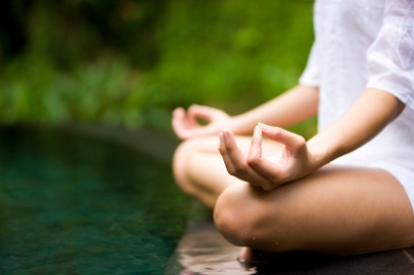Greetings! I am reposting this from a page that I stumbled upon on, well… StumbleUpon. It’s a list of 100 benefits of meditation, and that much more of a reason as to why it should be a part of everyone’s daily life. Please read and enjoy ^_^
Reposted from: http://www.stumbleupon.com/su/20GMVm/www.ineedmotivation.com/blog/2008/05/100-benefits-of-meditation/
There are so many advantages to meditation. When I first originally thought of this post, I indeed wanted to make it 100 benefits long (think big right!), however, I wasn’t sure I could find more than perhaps 20-25 benefits. Well, I made it happen! Meditation is as powerful as I thought it would be. Here is the definitive list of benefits that meditation can provide you with:
Physiological benefits:
1- It lowers oxygen consumption.
2- It decreases respiratory rate.
3- It increases blood flow and slows the heart rate.
4- Increases exercise tolerance.
5- Leads to a deeper level of physical relaxation.
6- Good for people with high blood pressure.
7- Reduces anxiety attacks by lowering the levels of blood lactate.
8- Decreases muscle tension
9- Helps in chronic diseases like allergies, arthritis etc.
10- Reduces Pre-menstrual Syndrome symptoms.
11- Helps in post-operative healing.
12- Enhances the immune system.
13- Reduces activity of viruses and emotional distress
14- Enhances energy, strength and vigour.
15- Helps with weight loss
16- Reduction of free radicals, less tissue damage
17- Higher skin resistance
18- Drop in cholesterol levels, lowers risk of cardiovascular disease.
19- Improved flow of air to the lungs resulting in easier breathing.
20- Decreases the aging process.
21- Higher levels of DHEAS (Dehydroepiandrosterone)
22- prevented, slowed or controlled pain of chronic diseases
23- Makes you sweat less
24- Cure headaches & migraines
25- Greater Orderliness of Brain Functioning
26- Reduced Need for Medical Care
27- Less energy wasted
28- More inclined to sports, activities
29- Significant relief from asthma
30- improved performance in athletic events
31- Normalizes to your ideal weight
32- harmonizes our endocrine system
33- relaxes our nervous system
34- produce lasting beneficial changes in brain electrical activity
35- Cure infertility (the stresses of infertility can interfere with the release of hormones that regulate ovulation).
Psychological benefits:
36- Builds self-confidence.
37- Increases serotonin level, influences mood and behaviour.
38- Resolve phobias & fears
39- Helps control own thoughts
40- Helps with focus & concentration
41- Increase creativity
42- Increased brain wave coherence.
43- Improved learning ability and memory.
44- Increased feelings of vitality and rejuvenation.
45- Increased emotional stability.
46- improved relationships
47- Mind ages at slower rate
48- Easier to remove bad habits
49- Develops intuition
50- Increased Productivity
51- Improved relations at home & at work
52- Able to see the larger picture in a given situation
53- Helps ignore petty issues
54- Increased ability to solve complex problems
55- Purifies your character
56- Develop will power
57- greater communication between the two brain hemispheres
58- react more quickly and more effectively to a stressful event.
59- increases one’s perceptual ability and motor performance
60- higher intelligence growth rate
61- Increased job satisfaction
62- increase in the capacity for intimate contact with loved ones
63- decrease in potential mental illness
64- Better, more sociable behaviour
65- Less aggressiveness
66- Helps in quitting smoking, alcohol addiction
67- Reduces need and dependency on drugs, pills & pharmaceuticals
68- Need less sleep to recover from sleep deprivation
69- Require less time to fall asleep, helps cure insomnia
70- Increases sense of responsibility
71- Reduces road rage
72- Decrease in restless thinking
73- Decreased tendency to worry
74- Increases listening skills and empathy
75- Helps make more accurate judgements
76- Greater tolerance
77- Gives composure to act in considered & constructive ways
78- Grows a stable, more balanced personality
79- Develops emotional maturity
Spiritual benefits:
80- Helps keep things in perspective
81- Provides peace of mind, happiness
82- Helps you discover your purpose
83- Increased self-actualization.
84- Increased compassion
85- Growing wisdom
86- Deeper understanding of yourself and others
87- Brings body, mind, spirit in harmony
88- Deeper Level of spiritual relaxation
89- Increased acceptance of oneself
90- helps learn forgiveness
91- Changes attitude toward life
92- Creates a deeper relationship with your God
93- Attain enlightenment
94- greater inner-directedness
95- Helps living in the present moment
96- Creates a widening, deepening capacity for love
97- Discovery of the power and consciousness beyond the ego
98- Experience an inner sense of “Assurance or Knowingness”
99- Experience a sense of “Oneness”
100- Increases the synchronicity in your life
Meditation is also completely FREE! It requires no special equipment, and is not complicated to learn. It can be practiced anywhere, at any given moment, and it is not time consuming (15-20 min. per day is good). Best of all, meditation has NO negative side effects. Bottom line, there is nothing but positive to be gained from it! With such a huge list of benefits, the question you should ask yourself is, “why am I not meditating yet?”
If you need a point to start from, you should try guided meditation courses. They are inexpensive and can provide you with a good foundation from which to begin meditating.
Make sure you meditate, there are quite simply too many positives to just ignore it.
Related articles from The Still Mind:
The “Silent Five” – Sitting With Your Self
Meditation And The Power of The Mind – Documentary

